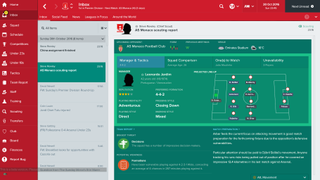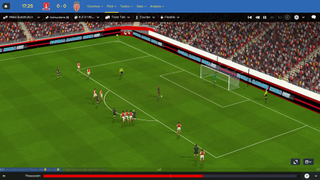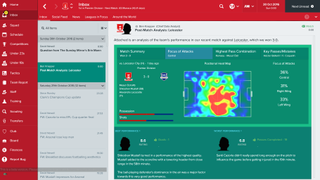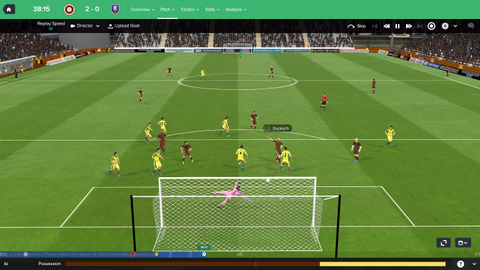Our Verdict
It’s far from revolutionary, but it is a very well refined version of Football Manager that empowers the player by putting all the information you need at your fingertips.
PC Gamer's got your back
What is it: An incredibly detailed football management sim that will consume your life.
Publisher: Sega
Developer: Sports Interactive
Expect to pay: £35 / $50
Reviewed on: i3-2120, AMD Radeon R9 270x, 8GB, Windows 10 desktop and a Core i3 @ 2.4 GHz, 4 GB, Windows 7 laptop.
Multiplayer: Yes
Link: Official site
Why did Leicester City draw attention from across the globe during the campaign that saw them become the most unlikely of champions? Why do Roma fans love Francesco Totti so dearly? That's because, whether it’s the timeless tale of the underdog, or of the hometown boy living the dream, football thrives on storytelling. Football Manager’s ability to capture that aspect of the beautiful game is what makes it such a success.
Though often described (not entirely without merit) as a glorified spreadsheet, Football Manager’s bedrock of stats and attribute numbers has proven to be fertile ground for the imagination. The game comes to life through the tales we tell ourselves and our fellow managers about our successes and failures—indeed, you can find entire forums dedicated to just such a purpose. That remains the case in Football Manager 2017. The game continues to create the compulsion to share the kinds of stories that experienced football managers will be familiar with—about the inspired tactical tweak that turned around a two goal deficit and delivered an extra time winner, about the rough diamond that you picked from obscurity and turned into a star, or about the non-league non-entity that you transformed into a force to be reckoned with.
These stories are given their power by virtue of the fact that your decisions matter. Paying attention to fluctuations in form and changing your team selection, or making a tactical tweak to exploit a weakness you have identified in an opponent are the kinds of details that are rewarded with success, and it is incredibly satisfying to have the time you spend drilling down into stats to inform those decisions pay off.

That your decisions matter in Football Manager isn’t new. What is new in Football Manager 2017 is the way that you are presented with the information you need to make those decisions, and how much easier it is to implement them. Whereas in previous entries, an email in your virtual inbox might send you spiralling off on a labyrinthine trek through menus and sub-menus, drop down boxes and sliders, you will now regularly be presented with clear and concise reports that can be acted on without leaving your inbox.
Each report you receive is subject specific—training, scouting, and so on—and is divided by sensible subheadings that makes the information being presented to you easy to interpret at a glance. Furthermore, each bit of advice you receive from your backroom staff comes attached with the reason that it is being proposed, such as to scout a particular central midfielder because it is a weakness in your squad, and, where practical, a tick box for you to click to action the advice.
Lest you wonder why I am getting so excited about a new report style, let me assure you that it makes a big difference to the way you play the game. Things that you couldn’t be bothered to do, or would just forget about, now get done by virtue of the fact that you don’t have to go out of your way to do them. Take the example of a player whose form has picked up: you now get an email pointing out that they’ve been playing well and suggesting it might be worth praising the player. It’s something that would otherwise be easy to overlook, but as anyone who has tried to turn around the fortunes of a team low on confidence will know, the small morale boost the player will get from this is the kind of detail that can make all the difference.
The improvements in the way the game presents information to you extends to match reports. Before games, you’ll get a pre-match report in your inbox with a handy graphic that displays your opposition’s formation in their last game, details on how and when they tend to score and concede goals, and other such info that you can use to inform your strategy. Post-game, you’ll get another report with a heat map that shows you what positions your players tended to take up, data on who made the most mistakes, a graphic to highlight your key passing combinations, and so on, helping you to reconsider your approach ahead of the next match. While some of this information was already available to you in Football Manager 2016, the problem was that you wouldn’t necessarily know it was there unless you actively went to seek it out, and even then, the fact that you had to made it a nuisance. Now all that information is just there. It’s easy to interpret, it’s easy to action, and in a game that’s all about decision-making, that makes all the difference.

Here it is that we reach what might be a sticking point for some players. That is the fact that the best thing about Football Manager 2017 isn’t strictly new. It is rather that the game is far better at presenting stuff that was already there to the player. That streamlining and refinement does make the game easier to play, and by extension, more fun, particularly for newcomers or those who haven’t played for a few years. If you are a hardcore fan, however, who already knew where to find all those data points and statistics, whether you will see this year’s entry as a significant step forward is questionable. I’d wager that you will appreciate the interface improvements, but you might ask yourself whether that’s enough to justify forking out for a new entry.
The social media feed’s inclusion is certainly necessary to reflect the way that football is covered in the modern media, but it is inconsequential when it comes to how you play the game.
There are some new features this year, of course, but they lack substance. The new social media feed might deal a blow to your ego the first time a fan takes you to task for a signing you are starting to have some niggling doubts about, but you quickly realise that every time you do something, your feed will be populated by some people who think you are a genius and others who think that you are a colossal buffoon. This probably quite accurately replicates what it is like to be a real football manager, but the split nature of your fanbase means that you soon start to ignore their comments. The social media feed’s inclusion is certainly necessary to reflect the way that football is covered in the modern media, but it is inconsequential when it comes to how you play the game.
The same can be said of the new staff roles of data analyst and sports scientist, very much in vogue in the real sport. Like physios and coaches, they are roles you need to fill, but once you have done so, there’s no need to think about them again. This may have been different if there was good reason to improve upon the staff you have as your club grows, but bizarrely, these new roles don’t have relevant stats that are highlighted when you are hiring them to tell you how good they are at their job, as is the case with other staff roles. This means you are left with little choice but to shrug your shoulders, pick someone at random, and let them get on with it.
It is also disappointing to see that nothing of note has been done to the press conference and player conversation systems that have been the weakest element of the series for some time. Their inflexible and repetitive nature means you will quickly fall into the habit of selecting the same stock replies you have been for years (sometimes to answer the same question twice in one interview) and will continue to feel like what you say often doesn’t matter. In a game where you frequently find yourself agonising over the tiniest of decisions, it is revealing that you pay little mind to any of the conversations that take place in the game.

One other potential negative is that, unlike last year, Football Manager Touch—the stripped-down, simplified version of the main game—is no longer included in the price and can only be purchased seperatley (unless you pre-ordered). I suspect that these games have two very different audiences—the one that wants the full experience and the one that is turned off by the main game’s complexity, so it seems unlikely that this will be a practical problem for most players.
There are things that we could point to that Football Manager 2017 could improve on, then, but it is still a fantastic game and a generous package. The perennial strengths of the Football Manager series are all there, that ridiculously detailed database (that’s so well researched that it has had an influence on real player transfers) will still have you forming unnaturally strong bonds with “players” that are in reality nothing more than a collection of numbers, will still have you shaking your fist in ecstatic celebration during the highs, and will still leave you worrying about how to drag your team out the relegation zone on your morning commute during the lows. In other words, the game still tells great player-led stories.
The greatest strength of Football Manager 2017 is that it removes the barriers between you and those stories. There is less time wasted clicking through menus and less occasion for you to feel like a loss is a result of something you forgot to do, rather than something you can accept as your own mistake. By improving how information is presented to you and making it easier to act upon, the game ensures that it is the decisions you make that are important, not whether or not you know how to find the right menu to make them, or if you knew it was possible to make a particular choice in the first place. That’s precisely how it should be, and it means that developer Sports Interactive has done a better job of addressing the sometimes daunting complexity of the series than it has done for years.
It’s far from revolutionary, but it is a very well refined version of Football Manager that empowers the player by putting all the information you need at your fingertips.

Intel CEO claims Core Ultra laptop chip is 'hot' but the company's near-term outlook still isn't exactly on fire

Elden Ring's uber boss Malenia says she has 'never known defeat', but your bank account sure will if you buy this 1:1 scale replica of her blade arm

It took 30 years, but a speedrunner's finished Doom 2's opening level in an unbelievable 4.97 seconds
